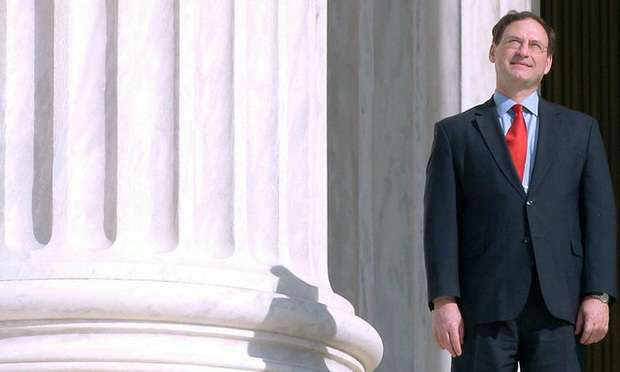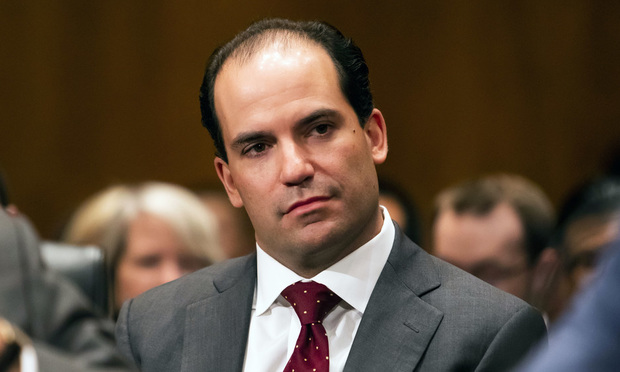How Justice Alito Signaled Defeat for DOJ in Key Age-Bias Case
During oral arguments, Alito told U.S. Solicitor General Noel Francisco: "I have a terrible time fitting your argument into the statutory language."
April 06, 2020 at 02:56 PM
5 minute read
The original version of this story was published on National Law Journal
 Justice Samuel Alito Jr. Credit: Diego M. Radzinschi / ALM
Justice Samuel Alito Jr. Credit: Diego M. Radzinschi / ALM
There are rare moments in oral arguments when a U.S. Supreme Court justice's statement becomes a "make or break" sign for an advocate's case. Justice Samuel Alito Jr. signaled the government's defeat during such a moment in a key job bias case the court decided on Monday—and written by Alito.
The moment came during arguments Jan. 15 in the case Babb v. Wilkie, a dispute involving federal employment and claims of age discrimination. Alito told U.S. Solicitor General Noel Francisco: "I have a terrible time fitting your argument into the statutory language."
In the 8-1 decision Monday, Alito, no supporter of broad interpretations of federal anti-discrimination laws, rejected the Justice Department's textual argument that federal employers are liable for age discrimination only when age is a "but-for" cause of a final employment decision. The federal sector provision in the Age Discrimination in Employment Act goes further than the government's argument, Alito said in Monday's decision.
"The plain meaning of the critical statutory language ('made free from any discrimination based on age') demands that personnel actions be untainted by any consideration of age," Alito wrote. "If age discrimination plays any part in the way a decision is made, then the decision is not made in a way that is untainted by such discrimination." The statute, he said, "does not require proof that an employment decision would have turned out differently if age had not been taken into account," he concluded.
The "but-for" rule has become a default in many high court discrimination cases. On March 23, the court unanimously applied the rule to a race discrimination suit. Justice Ruth Bader Ginsburg, in an opinion concurring in the judgment, acknowledged in a footnote that the court's precedents establish that form of causation as the default rule in the §1981 context, but, she wrote, "I have previously explained that a strict but-for causation standard is ill suited to discrimination cases and inconsistent with tort principles."
Alito has joined the majority or written majority opinions in those "but-for" cases. Those opinions, until recently, generally have divided the justices along ideological lines. The standard was injected into the Age Discrimination in Employment Act in a 2009, 5-4 decision that Alito joined in Gross v. FBL Financial Services.
Justice Clarence Thomas, the sole dissenter in Monday's Babb decision, wrote the majority opinion in the Gross case holding plaintiffs to the more stringent standard of proof than plaintiffs pursuing claims under the other major federal anti-discrimination statutes.
The dissenters in Gross, led by the late Justice John Paul Stevens, castigated the majority for deciding an issue the parties had not raised. The majority decision never reached the question on which review had been granted and which had been briefed by the parties.
 Roman Martinez of Latham & Watkins. Credit: Diego M. Radzinschi / ALM
Roman Martinez of Latham & Watkins. Credit: Diego M. Radzinschi / ALMIn the Babb case, Latham & Watkins partner Roman Martinez, counsel to Dr. Noris Babb, a clinical pharmacist at the Department of Veterans Affairs, had argued that language in the federal age-bias law—"made free from any discrimination"—applies to the entire decision-making process, not just the final decision.
"Today's decision vindicates the essential principle that discrimination has no place in federal employment," Martinez said. "As the court explained in its well-reasoned and thorough opinion, the law requires that federal personnel actions be untainted by any consideration of age."
The court's ruling holds the federal government to a stricter standard than private employers or state and local governments under the federal ADEA.
The but-for cause rule, however, still comes into play if plaintiffs seek the general remedies for a challenged personnel action, according to the court. To obtain general forms of relief, including hiring, reinstatement, back pay, and compensatory damages, a plaintiff still must show that age was a but-for cause of the actual challenged employment decision, "but if age discrimination played a lesser part in the decision, other remedies may be appropriate," such as injunctions and other steps to cleanse the workplace of age discrimination.
In his Babb dissent, Thomas said the majority's rule was "unworkable" and inconsistent with the text of the federal age-bias law.
"Today's decision is inconsistent with the default rule underlying our interpretation of antidiscrimination statutes and our precedents, which have consistently applied that rule." Thomas wrote. "Perhaps just as important, the court's holding unnecessarily risks imposing hardship on those tasked with managing thousands of employees within our numerous federal agencies."
Read more:
What Alito, Alone, Found 'Amazing' at Abortion Clinic Arguments
Why Ginsburg Joined Ruling Civil Rights Advocates Decry as 'Terrible'
Justice Gorsuch Would Be 'Grateful' if You'd Answer His Question
Thomas, in Lone Dissent, Thrashes 'Chevron' and His Own 'Brand X' Decision
This content has been archived. It is available through our partners, LexisNexis® and Bloomberg Law.
To view this content, please continue to their sites.
Not a Lexis Subscriber?
Subscribe Now
Not a Bloomberg Law Subscriber?
Subscribe Now
NOT FOR REPRINT
© 2025 ALM Global, LLC, All Rights Reserved. Request academic re-use from www.copyright.com. All other uses, submit a request to [email protected]. For more information visit Asset & Logo Licensing.
You Might Like
View All
With DEI Rollbacks, Employment Lawyers See Potential For Targeting Corporate Commitment to Equality
7 minute read
MoFo Associate Sees a Familiar Face During Her First Appellate Argument: Justice Breyer

Amid the Tragedy of the L.A. Fires, a Lesson on the Value of Good Neighbors
Law Firms Mentioned
Trending Stories
- 1The Rise and Risks of Merchant Cash Advance Debt Relief Companies
- 2Ill. Class Action Claims Cannabis Companies Sell Products with Excessive THC Content
- 3Suboxone MDL Mostly Survives Initial Preemption Challenge
- 4Paul Hastings Hires Music Industry Practice Chair From Willkie in Los Angeles
- 5Global Software Firm Trying to Jump-Start Growth Hands CLO Post to 3-Time Legal Chief
Who Got The Work
J. Brugh Lower of Gibbons has entered an appearance for industrial equipment supplier Devco Corporation in a pending trademark infringement lawsuit. The suit, accusing the defendant of selling knock-off Graco products, was filed Dec. 18 in New Jersey District Court by Rivkin Radler on behalf of Graco Inc. and Graco Minnesota. The case, assigned to U.S. District Judge Zahid N. Quraishi, is 3:24-cv-11294, Graco Inc. et al v. Devco Corporation.
Who Got The Work
Rebecca Maller-Stein and Kent A. Yalowitz of Arnold & Porter Kaye Scholer have entered their appearances for Hanaco Venture Capital and its executives, Lior Prosor and David Frankel, in a pending securities lawsuit. The action, filed on Dec. 24 in New York Southern District Court by Zell, Aron & Co. on behalf of Goldeneye Advisors, accuses the defendants of negligently and fraudulently managing the plaintiff's $1 million investment. The case, assigned to U.S. District Judge Vernon S. Broderick, is 1:24-cv-09918, Goldeneye Advisors, LLC v. Hanaco Venture Capital, Ltd. et al.
Who Got The Work
Attorneys from A&O Shearman has stepped in as defense counsel for Toronto-Dominion Bank and other defendants in a pending securities class action. The suit, filed Dec. 11 in New York Southern District Court by Bleichmar Fonti & Auld, accuses the defendants of concealing the bank's 'pervasive' deficiencies in regards to its compliance with the Bank Secrecy Act and the quality of its anti-money laundering controls. The case, assigned to U.S. District Judge Arun Subramanian, is 1:24-cv-09445, Gonzalez v. The Toronto-Dominion Bank et al.
Who Got The Work
Crown Castle International, a Pennsylvania company providing shared communications infrastructure, has turned to Luke D. Wolf of Gordon Rees Scully Mansukhani to fend off a pending breach-of-contract lawsuit. The court action, filed Nov. 25 in Michigan Eastern District Court by Hooper Hathaway PC on behalf of The Town Residences LLC, accuses Crown Castle of failing to transfer approximately $30,000 in utility payments from T-Mobile in breach of a roof-top lease and assignment agreement. The case, assigned to U.S. District Judge Susan K. Declercq, is 2:24-cv-13131, The Town Residences LLC v. T-Mobile US, Inc. et al.
Who Got The Work
Wilfred P. Coronato and Daniel M. Schwartz of McCarter & English have stepped in as defense counsel to Electrolux Home Products Inc. in a pending product liability lawsuit. The court action, filed Nov. 26 in New York Eastern District Court by Poulos Lopiccolo PC and Nagel Rice LLP on behalf of David Stern, alleges that the defendant's refrigerators’ drawers and shelving repeatedly break and fall apart within months after purchase. The case, assigned to U.S. District Judge Joan M. Azrack, is 2:24-cv-08204, Stern v. Electrolux Home Products, Inc.
Featured Firms
Law Offices of Gary Martin Hays & Associates, P.C.
(470) 294-1674
Law Offices of Mark E. Salomone
(857) 444-6468
Smith & Hassler
(713) 739-1250







